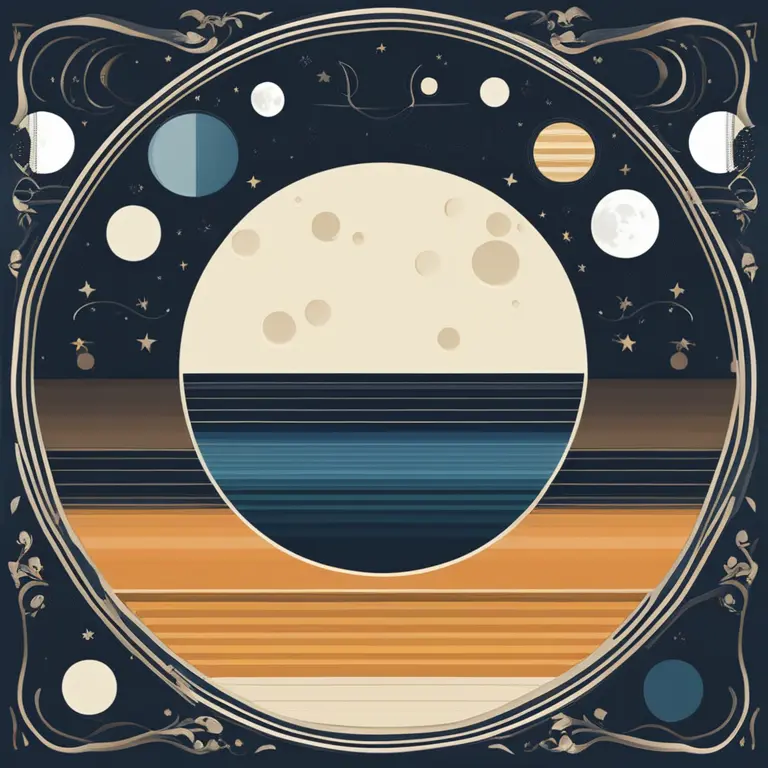
Moon Phases and Ocean Tides: Finding the Calm
Discover how the moon's phases influence tidal movements and learn which phase causes the lowest tides on our shores. Dive into the lunar-tidal connection!
article by Priya Deshmukh
Introduction to Moon Phases and Tides
The natural world is a dance of cosmic forces, and among them, the Moon plays a pivotal role in the rhythmic ebb and flow of our ocean's tides. The gravitational pull exerted by the Moon — supplemented by the Sun's own gravitational influence — orchestrates the rise and fall of sea levels. The tide's magnitude varies in a predictable pattern, governed by the lunar cycle. Understanding this celestial relationship is fundamental in anticipating tidal behavior and its consequent effects on maritime activities, coastal ecosystems, and even astrological interpretations.

Lunar Cycle: A Brief Overview
Our Moon transitions through distinct phases each month, a cycle that unfolds over approximately 29.5 days. It embarks on this journey from a new moon, invisible to our eyes, toward the full moon's complete illumination, only to wane back into obscurity. These phases — New Moon, Waxing Crescent, First Quarter, Waxing Gibbous, Full Moon, Waning Gibbous, Last Quarter, and Waning Crescent — are not merely visual phenomena but factors influencing tidal forces substantially.

The Neap Tide Phenomenon
So, which moon phase has the lowest tide? The answer lies within the Neap Tides, the modest siblings of the more dramatic Spring Tides. Neap tides occur twice each lunar month when the Moon and the Sun form a right angle relative to the Earth, coinciding with the First (or Last) Quarter Moon phases. During this alignment, the Sun's gravitational pull partially counteracts the Moon's, resulting in lower high tides and higher low tides. This moderated tide is the Neap Tide, the period when the difference between high and low tide is the least pronounced.

Observing Neap Tides in 2024 and Beyond
As you set your sights on the cosmic calendar of 2024 and onward, the predictability of Neap Tides remains steadfast. During these First and Last Quarter Moon phases, astrological forecasts highlight a time of equilibrium and balance, mirrored in the tranquil seas. Those attuned to the celestial pulses may find these periods conducive to introspection and moderate ventures, reflective of the subdued oceanic tides.

Practical Applications and Considerations
Mariners, fishermen, and coastal residents pay heed to the lunar schedule for practical reasons. Neap Tides signify safer, more stable conditions for marine activities due to reduced tidal currents. Environmental implications are also noteworthy; certain marine wildlife behaviors are timed with the rise and fall of tides, potentially affecting breeding and feeding patterns. As such, the ecological interplay during Neap Tides holds particular interest for conservationists and naturalists alike.
Astrological Significance and Symbolism
Astrologically speaking, the Quarter Moon phases — bearers of Neap Tides — symbolize moments of reflection and balance. The subdued tides serve as a metaphor for a tempered approach to life's challenges. As we advance past 2024, embracing the cosmic guidance of these phases can help navigate personal growth and relationships with a composed and serene outlook.
Published: 1/19/2024
Modified: 1/19/2024
More predictions
Come back here soon to learn more about yourself and your future


The Impact Of Moon Phases On Soulmate Connections
Discover the impact of lunar cycles on your quest for a soulmate and how each phase can influence romantic destiny.


The Dance of Sun and Moon Phases: Celestial Rhythms
Explore the synchronous bond between the moon phases and the sun's position in astrology, and how they influence our lives.


The Nighttime Moon Phase: When It’s Visible to Observers
Learn which moon phase graces the night sky and discover its unique characteristics and impact on astrology and personal biorhythms.